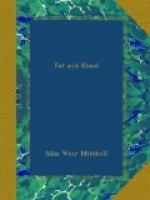There are, of course, numerous cases in which it becomes desirable to fatten and to make blood. In many of them these are easy tasks, and in some altogether hopeless. Persons who are recovering healthfully from fevers, pneumonias, and other temporary maladies gather flesh and make blood readily, and we need only to help them by the ordinary tonics, careful feeding, and change of air in due season.
It may not, however, be out of place to say here that when the convalescence from these maladies seems to be slower than is common, and ordinary tonics inefficient, massage and the use of electricity are not unimportant aids towards health, but in such cases require to be handled with an amount of caution which is less requisite in more chronic conditions of disordered health.
In other and fatal or graver maladies, such as, for example, advanced pulmonary phthisis, however proper it may be to fatten, it is almost an impossible task, and, as Pollock remarks, the lung-trouble may be advancing even while the patient is gaining in weight. Nevertheless, the earlier stages of pulmonary tuberculosis are suitable cases, and with sufficient attention to purity and frequent change of air in their rooms tubercular sufferers may be brought by this means to a point of improvement where open-air and altitude cures will have their best effects.
There remains a class of cases desirable to fatten and redden,—cases which are often, or usually, chronic in character, and present among them some of the most difficult problems which perplex the physician. If I pause to dwell upon these, it is because they exemplify forms of disease in which my method of treatment has had the largest success; it is because some of them are simply living records of the failure of every other rational plan and of many irrational ones; it is because many of them find no place in the text-book, however sadly familiar they are to the physician.
The group I would speak of contains that large number of people who are kept meagre and often also anaemic by constant dyspepsia, in its varied forms, or by those defects in assimilative processes which, while more obscure, are as fertile parents of similar mischiefs. Let us add the long-continued malarial poisonings, and we have a group of varied origin which is a moderate percentage of cases in which loss of weight and loss of color are noticeable, and in which the usual therapeutic methods do sometimes utterly fail.
For many of these, fresh air, exercise, change of scene, tonics, and stimulants are alike valueless; and for them the combined employment of the tonic influences I shall describe, when used with absolute rest, massage, and electricity, is often of inestimable service.
A portion of the class last referred to is one I have hinted at as the despair of the physician. It includes that large group of women, especially, said to have nervous exhaustion, or who are defined as having spinal irritation, if that be the prominent symptom. To it I must add cases in which, besides the wasting and anaemia, emotional manifestations predominate, and which are then called hysterical, whether or not they exhibit ovarian or uterine disorders.




